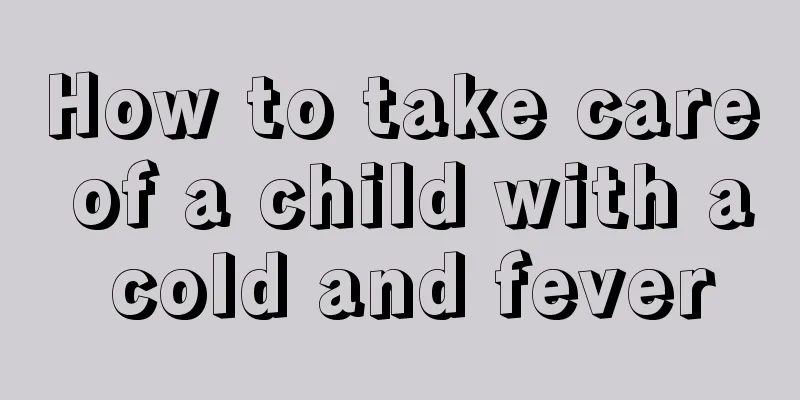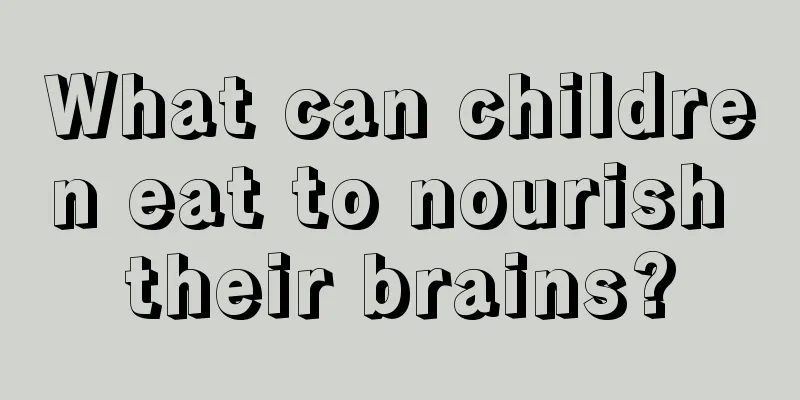How to take care of a child with a cold and fever

|
Children are the largest group suffering from colds and fevers, and are also the group most susceptible to cold viruses. Therefore, parents should pay attention to giving their children proper protection when taking care of them. For children who have already developed symptoms of colds and fevers, in addition to routine treatment, they also need some care for the children. Let’s take a look at how to take good care of children with colds and fevers. As the saying goes, "three parts illness and seven parts care", which fully illustrates the importance of nursing. 1. Rest is the best way to recover from physical fatigue and reduce body energy consumption. The body's regulatory functions of infants and young children are not yet perfect. Sometimes, children have a fever of 40°C but are in good spirits, so it is difficult for them to rest in bed. In order to prevent the child from going out to play and to ensure a good rest, let him listen to music, look at paintings, tell stories, play with building blocks, etc. in the room or on the bed as much as possible. When the child is not interested in games, hug him appropriately. 2. Drink more water. Water accounts for a large proportion of the body's tissue composition. The younger the age, the greater the proportion. The total amount of water in infants and young children accounts for 70-75% of their body weight. Due to fever, sweating occurs frequently and water consumption increases, so you need to drink more water to replenish it in time. Drinking more water can promote blood circulation, help to excrete toxins from the body through defecation and urination, and can also help lower body temperature. However, it is often the case that children refuse to drink water. In this case, parents have to find ways to solve the problem, such as adding some fresh fruit juice to the water. Children with loose stools should not drink too much sugar water. They can drink some light tea. Tea contains tannic acid, which has an astringent effect on stool. 3. Diet adjustment. After a child becomes ill, his digestive function is reduced, and his appetite decreases and he has a poor appetite. Eating too much nutritious food at this time cannot be absorbed and utilized, but will increase the burden on the gastrointestinal tract. It is best to feed the child with nutritious and easily digestible food based on his/her usual eating habits, such as milk, soy milk, steamed eggs, porridge, noodles, etc. If the child has a high temperature and refuses to eat, you can feed him small meals more often, with smaller amounts eaten each time. If the child really does not want to eat, parents should not force him or her. |
<<: What causes mental retardation in children?
>>: What should we pay attention to when giving enema to children?
Recommend
Should children be covered with blankets when they have a fever?
Fever is a normal reaction of our body. It often ...
What are the treatments for allergic cough in children?
If a child suffers from a disease such as allergi...
What are the causes of air conditioning disease in children?
Children's air-conditioning disease is a new ...
What is high bilirubin?
There is an item called bilirubin in the physical...
Is influenza A serious in children?
Influenza A is a type of influenza, and it is mor...
How to properly care for your baby when he or she has rubella
If the baby has wheals, parents need to understan...
What causes abdominal distension in children?
Every mother should have experienced a similar si...
How to deal with burns and blisters on children?
Children's skin is still very tender. Once sc...
What's wrong with the bloodshot on the child's face?
If there are blood streaks on the skin on the fac...
How to treat children's constant nosebleeds
A child's body gradually improves during the ...
How to treat baby burping after drinking milk
In daily life, many mothers may feel at a loss as...
What are the dangers of children eating snacks?
It is a common symptom for children to love snack...
Treatment of cough and fever in 3-year-old baby
Many of us are particularly susceptible to catchi...
Is it normal for a newborn to sleep through the night?
Babies are the apple of their parents' eyes. ...
What should I do if my four-month-old baby has eczema on his head?
Eczema is a common skin disease. In many cases, e...









